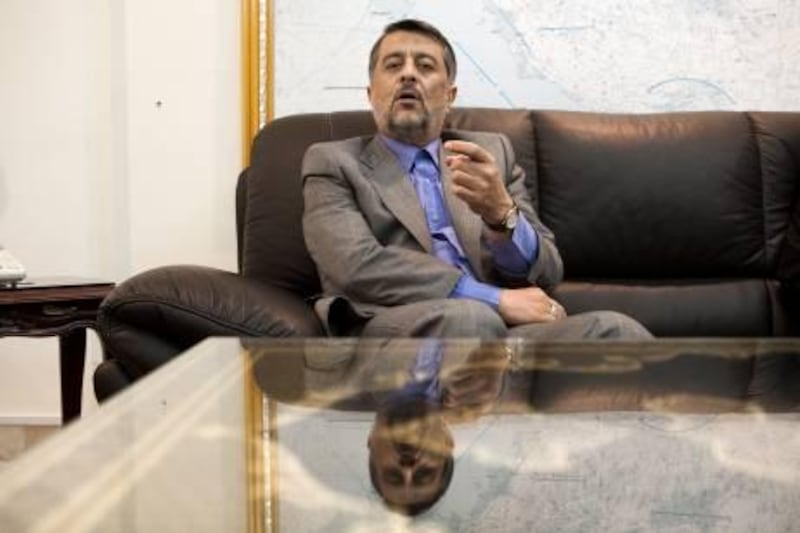ABU DHABI // Iran's ambassador to the UAE has dismissed reports that his country had cut trade ties with the Emirates, saying it would "never" want to hurt neighbouring nations by meddling in their affairs.
"We want to stress again and again, Iran does not and will not meddle nor interfere in any of the neighbouring or elsewhere countries' affairs," said Dr Mohammed Reza Fayyaz.
It follows statements issued this week by the Gulf Cooperation Council during its annual summit in Riyadh. The GCC had called on Iran to change its regional policies and "stop meddling" in the internal affairs of its six member states. GCC countries have repeatedly accused Iran of inciting this year's protests in Bahrain.
At the summit, Saudi Arabia signalled a change in its approach to Iran, when its foreign minister, Prince Saud Al Faisal, said his country was prepared to negotiate with Iran to improve relations.
For his part, Mr Fayyaz said Iran had "sent several high-level delegations to Saudi Arabia in just the past three months. Saudi Arabia is now reciprocating. That is a good thing for everyone".
Iranian-Saudi relations took a knock this year when the kingdom sent security forces to Bahrain to help quell the protests. Iran was also accused of being behind a plot to kill the Saudi ambassador to the US.
"The truth always comes out in the end, so we are not bothered with whatever accusations are being made against us," said Dr Fayyaz.
Dr Fayyaz said 2011 had been an "eventful year", in which he had met the President of the UAE, Sheikh Khalifa, and the rulers of the other emirates, as well as other senior officials. "There isn't an official who I didn't go and meet," he said.
The ambassador said the "brotherly" relationship between Iran and the UAE remained strong - despite what had been reported in the media - and was "growing stronger".
He dismissed last week's reports of Iran halting its trade relations with UAE, calling them "completely false".
"There was a technical glitch where orders could not be placed on the website of the industries, mines, and commerce ministry of Iran, and everyone jumped on this and said that Iran stopped trading with UAE," he said.
"This shows that anything that happens in Iran, no matter how small, gets the attention of the entire world and is blown out of proportion."
Besides its historic and political relationship with the UAE, the ambassador said the trade relationship was not something to be taken lightly. "We are talking about a relationship worth more than 10 billion euros in trade," he said, adding that the actual figure was a "secret".
There are no official figures for the number of Iranians in the UAE, although estimates put it at more than 400,000.
With regard to the three UAE islands occupied by Iran, the ambassador said there were no new developments.
He also praised the UAE Vice President, the Prime Minister and Ruler of Dubai, Sheikh Mohammed bin Rashid, for his latest comments on Iran during an interview with CNN earlier this month.
Sheikh Mohammed said: "Iran is our neighbour, they are Muslim and we lived next to each other for thousands and thousands of years. I don't believe that Iran will get a nuclear weapon, I don't think so."
"His Highness spoke the truth," said the ambassador. "We are not building nuclear weapons, we are building nuclear power plants for the energy needs of a nation of over 74 million people."
As for Syria - Iran's closest ally - the ambassador said his government had been in deep talks with the Syrian president, Bashar Al Assad. "We really hope for peace in Syria, and for its peoples' demands to be heard and given for the sake of stability. Cooperation with the Arab league is in Syria's best interest."
Turning his attention to the international arena, Dr Fayyaz reiterated his government's stance on the case of the American spy drone that was captured in Iranian airspace on December 4, calling it "a serious violation and the US should be held accountable for it".
"The US just keeps on trying and trying to pin something on us and to isolate us further," he said. "It is looking for a false excuse to target us, like it did with Iraq and Afghanistan ... We should be getting full marks for the number of times they tested us with some issue or other."
As for fears of a possible war on Iran, Dr Fayyaz said: "If anyone should attack us, we will defend ourselves and every inch of our land. We won't allow anyone to compromise our people and country."
He said Iran's two biggest enemies were "first, the Shaytan ["devil"] and second Israel".
But he added: "Iran will never launch a war against any of its brother and sister nations. Just look at our history in the past 100 years, we never started a war."
The embassy and the consulate are preparing for elections in March, when Iranians will vote for a new National Consultative Assembly.






